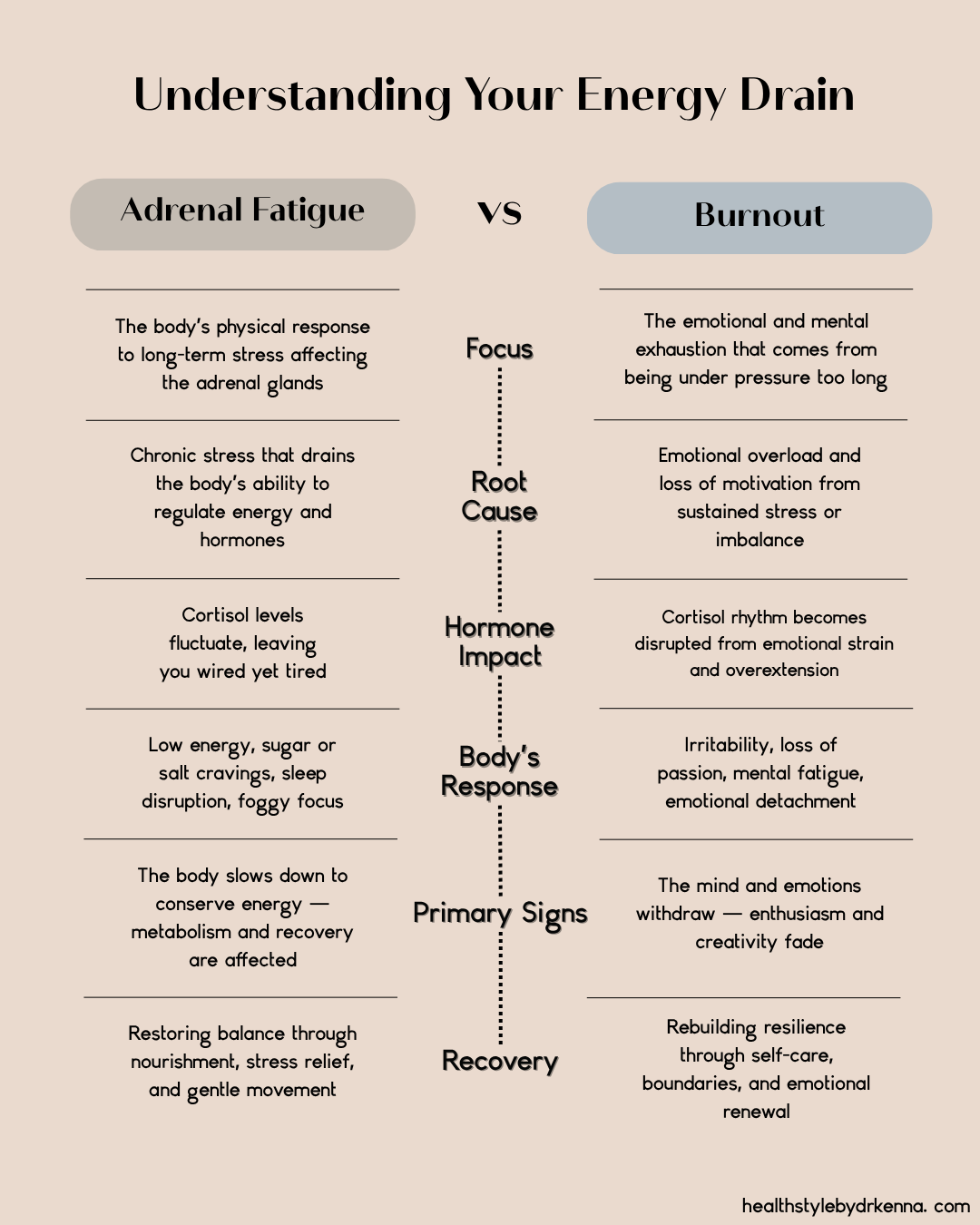Adrenal Fatigue vs Burnout: Understanding the Difference
If you’ve been running on caffeine, willpower, and “just one more thing,” yet still wake up exhausted, your body may be softly asking (or shouting) for help. Many high-performing women come to me wondering—is this adrenal fatigue or burnout in high-achieving women? Both are the body’s response to chronic stress, where your adrenal glands can no longer keep up with cortisol’s constant demand.
Adrenal fatigue often feels like total depletion—your body simply can’t rebound. Burnout, meanwhile, hits your spirit—emotional exhaustion, disconnection, and a loss of joy. They overlap, but the message is the same: your body wants restoration, not more resilience. In this guide, we’ll explore the difference—and how to start listening before you crash.
Key Takeaways
Adrenal fatigue vs burnout: Both are responses to chronic stress, but adrenal fatigue mainly affects energy and hormone balance, while burnout impacts emotional health and motivation. Understanding the difference helps in early intervention.
Recognize the symptoms early: Persistent fatigue, brain fog, sugar or caffeine cravings often signal adrenal fatigue, whereas emotional exhaustion, detachment, and irritability indicate burnout. Early recognition supports faster recovery.
Holistic recovery is essential: Effective adrenal fatigue and burnout treatment involves stress reduction, hormone regulation, nutrient-dense nutrition, gentle exercise, and emotional and nervous system support.
Prioritize rest and sustainable health: Resting, setting boundaries, and functional medicine guidance are key to restoring energy, stabilizing cortisol rhythms, and preventing long-term adrenal or burnout-related health issues.
What Is Adrenal Fatigue?
If you’ve been living in go-mode for months (or years), running on pressure and nonfat lattes, your body might be waving a quiet red flag called adrenal fatigue. In simple terms, it’s what happens when chronic stress keeps your adrenal glands, the small but powerful regulators sitting above your kidneys, stuck in overdrive. These glands release hormones like cortisol, your main stress messenger, to help your body handle whatever life throws at you.
But when the demands never stop, cortisol production becomes erratic, spiking when you need calm, crashing when you need energy. Over time, this dysregulation can leave you feeling bone-tired, wired at night, moody, or unable to recover even after rest.
While “adrenal fatigue” isn’t a formal medical diagnosis, in functional medicine we view it as the body’s early cry for balance —a signal that your stress response system is overwhelmed and needs care. It’s not about weakness; it’s about wisdom. Your body isn’t failing you, it’s asking you to finally listen.
What Is Burnout?
Burnout isn’t simple tiredness; it’s a full-body and soul-level depletion that happens when chronic stress becomes your normal. You’ve been “on” for too long, carrying too much, and your body finally says, “Enough”. The spark that once fueled you starts to dim, and no amount of sleep or caffeine seems to bring it back.
Recognized by the World Health Organization, burnout is a state of emotional, mental, and physical exhaustion that often comes with detachment, irritability, and loss of purpose. But it’s not just in your head; your biology feels it too.
Prolonged stress alters hormone balance, flattening your natural cortisol rhythm and leaving your system dysregulated and drained (Frontiers in Psychiatry).
While burnout is often labeled “psychological,” in truth, it’s an embodied experience, your nervous system and hormones echoing your emotional fatigue. Healing starts when you stop pushing through and start tending to what your body’s been whispering all along: rest is not weakness; it’s wisdom.
Adrenal Fatigue vs Burnout
Symptoms of Adrenal Fatigue and Burnout
Adrenal fatigue and burnout are often two sides of the same coin—rooted in chronic stress and disrupted cortisol rhythms, yet expressed differently through the body and mind. Both reveal a nervous system stuck in survival mode and a hormone system stretched beyond its natural capacity.
When you’ve been “on” for too long, your body begins to whisper, then shout, for you to slow down. Learning to recognize these signs isn’t about self-diagnosis; it’s about self-awareness and honoring what your body has been trying to tell you all along.
Adrenal Fatigue Symptoms
When your adrenal glands are overworked and can’t keep up with constant demand, you might experience:
Persistent fatigue even after rest or sleep
Cravings for salt, sugar, or caffeine to “push through” the day
Brain fog, forgetfulness, or low mental clarity
Lightheadedness when standing or consistently low blood pressure
Sleep disturbances, early waking, or feeling wired at night but tired by morning
Hormonal fluctuations—low libido, irregular cycles, or worsening PMS symptoms
Burnout Symptoms
Burnout starts in the emotional landscape but ripples into every cell of your being. You may notice:
Emotional exhaustion or detachment from work, relationships, or purpose
Loss of motivation, inspiration, or sense of fulfillment
Irritability, anxiety, or an undercurrent of low mood
Changes in sleep—insomnia, restless nights, or oversleeping to escape
Physical fatigue, lowered immunity, or feeling “used up”
These are not signs of weakness—they’re invitations. Your body is not broken; it’s wise. It’s asking for stillness, nourishment, and permission to heal.
Causes of Adrenal Fatigue and Burnout
At the root of both adrenal fatigue and burnout lies one powerful force: stress—relentless, layered, and often invisible until the body begins to break down. When chronic stress becomes your norm, your adrenal glands, those small but vital stress regulators, are constantly pushed to release hormones like cortisol.
Over time, your cortisol levels fluctuate wildly, too high when you need calm, too low when you need energy, leaving you running on fumes. While the triggers may appear different —physical vs. emotional —the root cause is the same: your body’s prolonged exposure to stress.
Common Causes Include:
Ongoing stress from work, caregiving, or emotional overload
Overexertion and intense exercise without enough recovery
Poor sleep, skipped meals, and nutrient depletion that disrupt hormone balance
High caffeine or stimulant use that flattens healthy cortisol rhythms
Hormone fluctuations during menopause, pregnancy, or perimenopause
Emotional stress, overachievement, and perfectionism that keep the nervous system “on”
Unresolved inflammation or chronic illness is burdening the adrenal glands
Each of these factors chips away at your body’s natural rhythm, gradually dysregulating cortisol levels and draining your energy reserves. When your system stays in go-mode too long, your biology forgets how to rest, and healing begins with remembering how.
Treating Adrenal Fatigue and Burnout
Healing is not a race; it’s a rhythm. Here’s my step-by-step framework to recover from adrenal fatigue and burnout with clarity and compassion:
Identify and reduce chronic stressors
Name what overloads you, work demands, caregiving, mental loops, and trim them. Set firm boundaries, delegate, and schedule true rest as non-negotiable.Restore adrenal and hormone balance
Rebuild a steady daily cadence: consistent bed/wake times, morning light, and protein-rich meals. This helps reset cortisol and steadies your hormone signaling.Choose restorative movement
Prioritize regular gentle exercise, walking, yoga, and mobility flows. These rebuild capacity without taxing the adrenal gland, and keep you connected to your breath.Support the body through nourishment
Eat to stabilize: protein + fiber + healthy fats each meal, with minerals and micronutrients to replete reserves. Think hydration, electrolytes, vitamin C, B-complex, and magnesium to support energy regulation.Build emotional and nervous system resilience
Practice micro-restorations: mindful pauses, paced breathing, journaling, and somatic techniques. Consider functional health coaching to reframe patterns that perpetuate stress.Work with a qualified practitioner
If fatigue persists, assess adrenal fatigue patterns alongside thyroid, iron, and micronutrient status. Targeted labs can clarify drivers of burnout and guide individualized care.
Healing is not about pushing harder; it’s about listening sooner, choosing less, and honoring what your system has been asking for all along.
FAQ
-
Adrenal exhaustion goes beyond normal fatigue. You may wake up unrefreshed, feel drained throughout the day, and rely on caffeine or sugar to keep going. Mental fog, low motivation, and a sense of being “done” are common signs your nervous system is overworked.
-
Focus on hydration: electrolyte water, coconut water, and soothing herbal teas like chamomile or licorice root. Limit caffeine, as it spikes cortisol and strains your adrenals further.
-
Description Recovery isn’t linear—it’s layered. Healing adrenal fatigue or burnout depends on how long your system’s been under strain. With consistent care, most women begin to feel energy returning in a few months—true restoration unfolds over time as your body learns safety again.text goes here
Final Thoughts
Adrenal fatigue and burnout may wear different faces, but both stem from the same source—unchecked stress that pushes your body beyond its natural limits. These experiences aren’t random or hopeless; they’re messages inviting you to slow down, restore balance, and nurture your health from the inside out. True healing happens when you stop forcing your system to perform and start supporting it in its recovery.
Exhaustion isn’t failure, it’s feedback. Your body is communicating, asking for rhythm instead of rush, nourishment instead of numbness. With the right awareness, tools, and guidance, recovery is not only possible, it’s inevitable.
✨ If you’re ready to move from survival to sustainable vitality, I’d love to help you get there.
Explore working with HealthStyle by Dr. Kenna
Start Your Health Coaching Today
Disclaimer
This content is based on over two decades of clinical experience and is provided for educational and informational purposes only. The strategies and insights shared here reflect a functional health approach rooted in evidence and personalization.
This article is not intended to diagnose or treat any condition. Always consult your physician or trusted healthcare provider before beginning any new health protocol. At HealthStyle by Dr. Kenna, we don’t diagnose—we decode.




